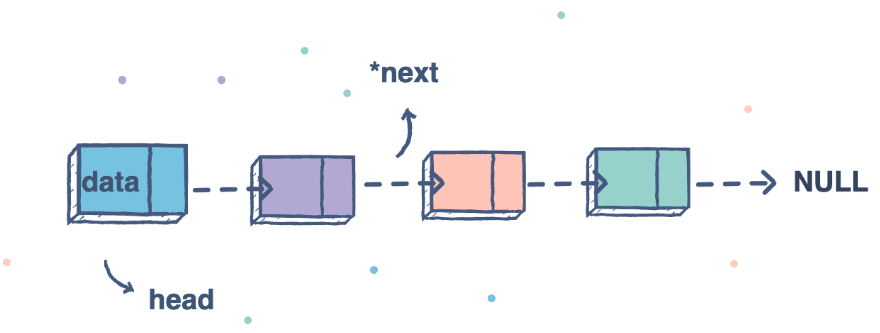
Photo by Kelly Sikkema on Unsplash
Linked List Implementation In Kotlin -Data Structure And Algorithms
A Linked List is a common data structure made of a chain of nodes in which each Node contains a value and a pointer to the next node in the chain. The head pointer points to the first node and the last element of the first node and last element of the list points to NULL. When the list is empty, the head pointer points to NULL.

data class Node(val value: Int){
var next : Node? = null
}
-> In simple words, a linked lists consists of nodes where each node contains a data field and a reference (link) to the next node in the list.
Linked lists can dynamically increase in size and it is easy to insert and delete from a linked list because unlike arrays, we only need to change the pointer of the previous element and the next element to insert or delete and element.
Time Complexities :D
- Look Up
By Value -> O(n) By Index -> O(n)
- Insertion
At The End -> O(1) At The Beginning -> O(1) In The Middle -> O(n)
- Deletion
From The Beginning -> O(1) From The End -> O(n) From The Middle -> O(n)
Implementation <33
class MyLinkedList {
private var first: Node? = null
private var last: Node? = null
private var size: Int = 0
fun addLast(value: Int) {
val node = Node(value)
// if array is empty
if (first == null) {
first = node
last = node
} else {
last?.next = node
last = node
}
size++
}
fun addFirst(value: Int) {
val node = Node(value)
if (first == null) {
first = node
last = node
} else {
node.next = first
first = node
}
size++
}
fun removeFirst() {
if (isEmpty()) throw Exception("No Such Index Exists")
if (first == last) {
// if there's only one item in the list...
first = null
last = null
} else {
val second = first?.next
first?.next = null
val first = second
}
size--
}
fun removeLast() {
if (isEmpty()) throw Exception("No Such Index Exists")
val previousLast = getPrevious(last)
if (first == last) {
// if there's only one item in the list...
first = null
last = null
} else {
last = previousLast
last?.next = null
}
size--
}
fun toArray(): Array<Int> {
val array = Array(size){0}
var index = 0
var currentNode : Node? = first
while (currentNode != null) {
array[index++] = currentNode.value
currentNode = currentNode.next
}
return array
}
fun getSize(): Int = size
private fun getPrevious(node: Node?): Node? {
var current: Node? = first
while (current != null) {
if (current.next == node) return current
current = current.next
}
return null
}
fun printList() {
var currentNode: Node? = first
while (currentNode != null) {
println(currentNode.value)
currentNode = currentNode.next
}
}
fun indexOf(value: Int): Int {
if (isEmpty()) return -1
var currentNode: Node? = first
var index: Int = 0
while (currentNode != null) {
if (currentNode.value == value) return index
index++
currentNode = currentNode.next
}
return -1
}
fun contains(value: Int): Boolean = indexOf(value) != -1
fun isEmpty(): Boolean {
return first == null
}
}
